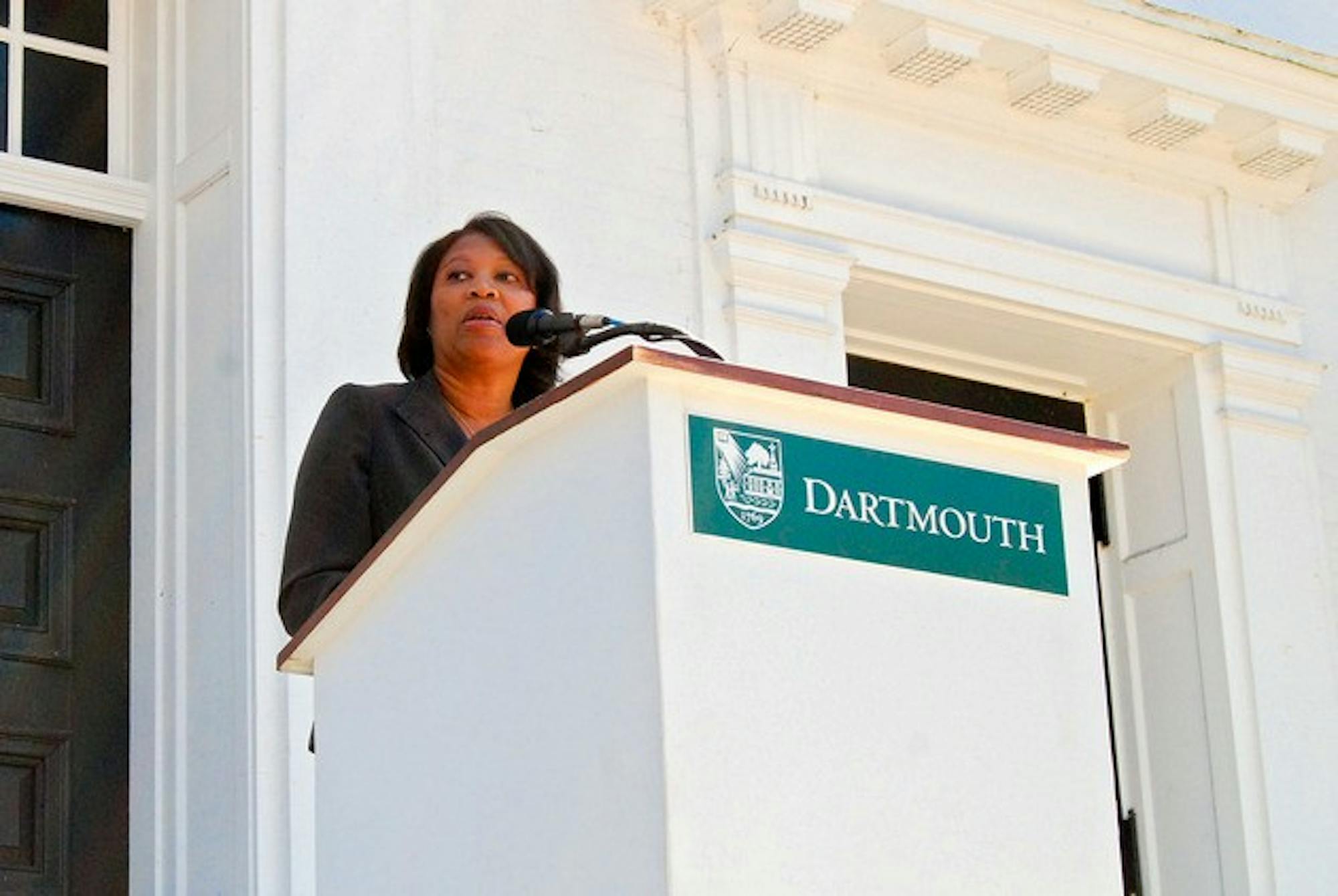This year's topics included the mandatory meal plan, the quality of medical care at Dick's House and Committee on Standards procedures for hearing disciplinary cases.
The group received a few hundred submissions via Google Moderator, a platform that allows participants to submit and vote on questions. Palaeopitus member Cole Adams '13 served as a moderator for this year's discussion and asked Johnson the most popular questions received.
Since many submitted questions overlapped, the five most popular questions were reflective of the general sentiment of students' concerns, Adams said. Johnson was given a copy of the questions ahead of time to prepare answers.
In response to why meal plans are required for all students, Johnson called the College's policy "an intentional tool to build community." She described Class of 1953 Commons as "one of the primary social hubs on campus" and "middle of the pack" in pricing compared to Dartmouth's peers.
While Johnson does not eat at 1953 Commons regularly, she said she enjoyed her meals there and judged the experience as cost-effective for the quality of food and service.
In regards to the rising tuition costs, Johnson said the College's most recent tuition increase, 3.8 percent, was one of the lowest in recent years.
President-elect Philip Hanlon's work at the University of Michigan to keep the school affordable in light of state cuts to education funding made him an attractive presidential candidate, Johnson said.
The College's Financial Aid office has worked to increase financial aid at a greater rate than tuition increases, she said, citing that tuition is free for families making $100,000 or less as a success of this effort. Johnson said student debt at Dartmouth is much lower than at peer institutions.
Dartmouth graduates leave the College with an average of $19,000 in debt. In 2011, Brown University's debt burden was the highest in the Ivy League at $20,455. Excluding Columbia University, which did not report statistics, other Ivy league graduates had an average debt less than $20,000. Princeton graduates, with an average of $5,330 in debt per graduate, had the lowest loan debt among the Ivies.
Although the changes to the College's hazing policy have only been in effect for six months, Johnson said the administration believes the policies are already contributing to positive changes to the campus climate. She pointed to increases in reports of hazing and student involvement to eradicate hazing as early signs of the policies' success.
Johnson was also asked about the quality of treatment at Dick's House. She said medical care is subject to state and federal compliance standards as well as internal reviews and any student, staff or parent that is unhappy with the treatment by Dick's House can contact her directly as well as either Jack Turco or Mark Reed, Dick's House's co-directors.
Since Johnson joined the College's staff in 2011, she said she has pressured Dick's House to increase the accessibility of its counseling and human development services, decreasing two week wait times for counseling appointments to two or three days.
Johnson fielded a question about COS proceedings, highlighting gradual change.
A year and a half ago, the President's Committee on Sexual Assault made 12 recommendations to COS, all of which were adopted and are being implemented, Johnson said. The recommendations included increasing first responder training for staff and undergraduate deans, and hiring a new special investigator to investigate sexual assault cases.
"Those cases tend to be a little more complex sometimes than other cases, and having a requisite training and being prepared for what's to come is really important," Johnson said. "I still think we can continue to improve there, because I believe in a continuous improvement in evaluation loops."
Overall, Adams said Johnson answered the questions "appropriately," but the nature of the discussion did not allow for follow-up questions. In the future, Adams said changing to a more conversational model might be helpful to "follow up and dig a little deeper."
"Google Moderator is meant to just get students' questions out there, so it's easy to be critical of an answer," Adams said. "At the end of the day, it wasn't meant to be a combative thing, it was more of a Here's a question, what do you want to say to that?' kind of thing."
In his experience on Palaeopitus, Adams noticed that students are often frustrated by the long time frame for campus changes initiated by the administration, which often take five to 10 years to implement, while students are only on campus for four years.
While an "understandable" frustration, he said many students do not realize that administrators like Johnson make themselves available to students on a regular basis through holding office hours or attending community dinners.
"That doesn't necessarily mean that your voice is going to be listened to in a meaningful sense, but there are certainly avenues of communication that aren't necessarily being fully taken advantage of by students," he said.
Palaeopitus sent a campus email on April 1 asking students to submit questions and vote on their favorites.
"It's easy to say, the administration sucks' but it is also very difficult to make kids engaged," Adams said.




